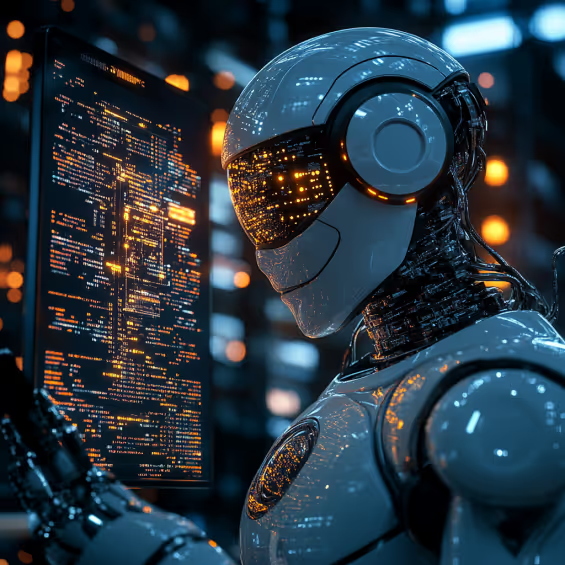AI Policing in Crypto: How Will It Impact Jobs?

I’m on a call with a developer who just lost their job because their firm integrated AI policing in crypto to monitor transactions. It wasn’t just a regular AI tool; it was one designed to predict and flag suspicious activity, cutting down manual reviews. Now, this wasn’t a rare situation—it's a trend that's reshaping the entire crypto landscape.It got me thinking, is AI policing in crypto a threat or an opportunity for jobs in this space? Having been knee-deep in crypto recruitment for years, I’ve seen waves of tech advancements shake up job markets, but there’s something unique about AI’s role in crypto policing. Let’s break it down and explore how this tech shift is transforming the job market.
AI's Role in Compliance: A Double-Edged Sword
Let’s not sugar-coat it: compliance roles in crypto have taken a hit. Regulatory crackdowns mean companies are under pressure to ensure transactions are clean and lawful. That’s where AI policing comes in—algorithms monitoring transactions, sniffing out potential fraud, and flagging suspicious behaviour faster than any human team ever could.In theory, this sounds brilliant. But here’s the flip side: many compliance officers I’ve worked with are seeing their roles being redefined, or worse, becoming redundant. One company I recruited for had slashed their compliance team by 30% after onboarding an AI system that could handle thousands of transactions in minutes. “It’s just more efficient,” they told me.But is it really? AI might handle volume, but the nuances—like understanding cultural or regional intricacies in transactions—are still best navigated by humans. So while the demand for traditional compliance jobs may shrink, there’s an emerging need for those who can oversee these AI systems. Think of it as a shift, not a complete wipeout.
New Jobs Are Emerging: Enter AI Specialists
One of the most exciting trends I’ve noticed is the rise of AI specialists within crypto firms. The companies that laid off compliance officers? They’re now hiring AI engineers, data scientists, and algorithm trainers.I recently helped place an AI specialist in a firm that wanted someone to optimise their transaction-monitoring system. His job? Fine-tune the algorithms to reduce false positives while staying compliant with regulatory changes. This isn’t just a short-term trend either—AI policing in crypto means long-term opportunities for those skilled in artificial intelligence.And here's something even more interesting: companies aren't just looking for techies who can code. They want people who understand both AI and the unique quirks of blockchain. If you can marry those two skills, you’re golden. It’s no longer about choosing between AI or blockchain; the future demands you understand both.
The Human Touch: Why AI Can't Replace Everyone
Despite the hype around AI, there’s a key fact that often gets overlooked—AI, no matter how advanced, still needs humans. A case in point: one of the companies I worked with had a major issue when their AI flagged a perfectly legitimate transaction as suspicious. The problem? The AI didn’t grasp the context, and it took a human to step in and clear the confusion.This is where I see a massive opportunity for jobs. AI policing might be smart, but it’s still not capable of handling complex decisions that require judgement. Compliance officers who can work alongside AI, interpreting data and making executive decisions, are going to be invaluable. The demand for roles where human oversight and judgement are crucial won’t just survive—they’ll thrive.So, while some jobs may shift or evolve, the need for people who can understand AI’s limitations and step in when needed is only going to grow. If you’re in a crypto job right now, my advice? Don’t fear AI—figure out how to work with it.
Adapt or Get Left Behind: Upskilling is Essential
If there’s one thing I’ve learned from my years in crypto recruitment, it’s that those who adapt, thrive. AI policing in crypto is no different. It’s not about whether AI will change things—it’s already happening. The question is: are you prepared to evolve with it?I’ve seen professionals pivot from compliance roles to becoming AI system auditors, where their job is to ensure the algorithms aren’t biased or malfunctioning. Others are diving into courses on AI and machine learning, recognising that understanding these systems is now a crucial part of staying relevant in the crypto space.One of the most rewarding placements I made recently was for a mid-level compliance officer who, after taking an AI certification, landed a role as an AI compliance manager. His new role involved working with developers to audit and refine the AI policing systems. It’s a perfect example of how upskilling can not only save your job but propel you into a new, high-demand role.
The Future is a Blend of AI and Human Expertise
AI policing in crypto is here to stay, but that doesn’t mean the job market is dead—it’s just shifting. The rise of AI means there’s a need for a new breed of professionals who can navigate both the tech and human sides of blockchain. It’s about understanding where the tech shines and where it still falls short, and being ready to step in with human intuition when needed.So, if you’re working in crypto or considering a career in this field, don’t view AI as a threat. It’s an opportunity. The key is to stay curious, keep learning, and be ready to adapt. Because, as I’ve seen first-hand, those who embrace change are the ones who come out on top.
